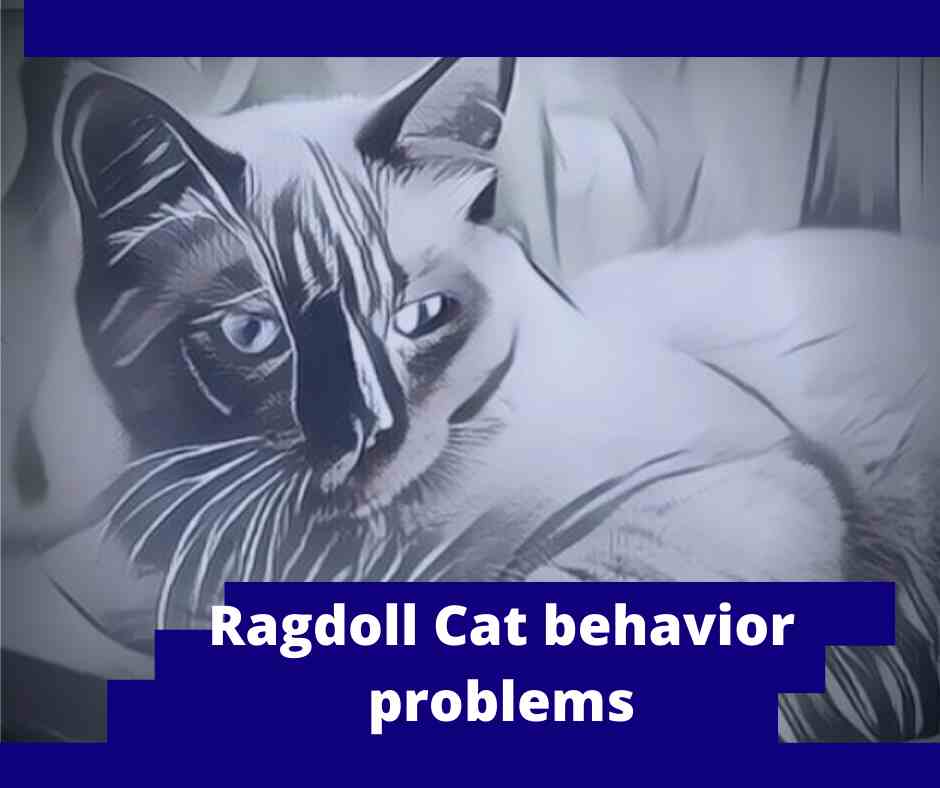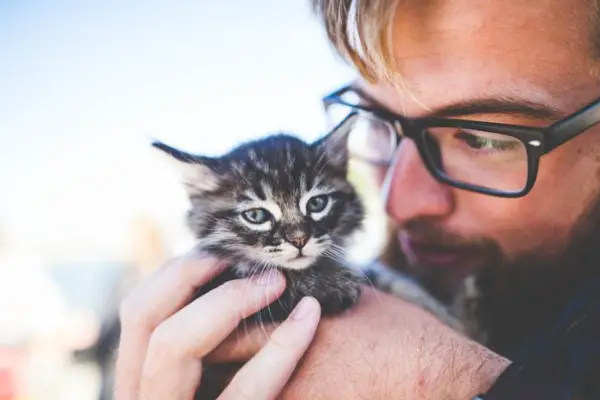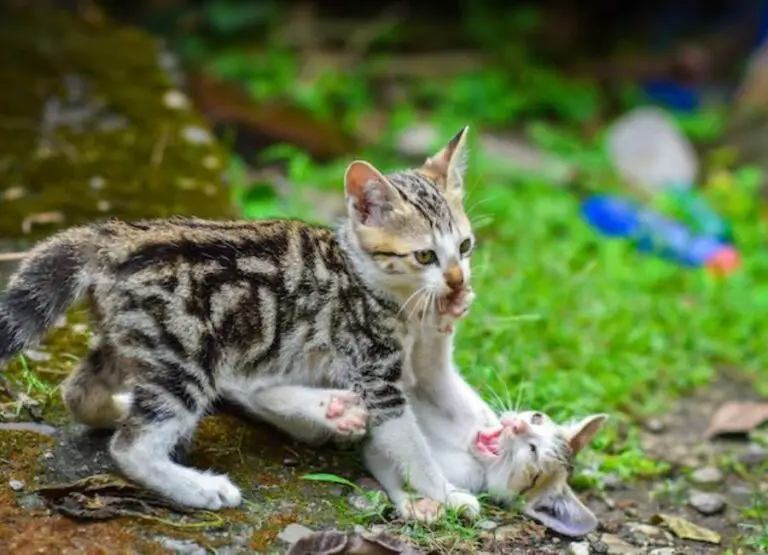12 Ragdoll Cat behavior problems You Should Know

As a big fan of Ragdoll cats, I hear people ask about Ragdoll cat behavior problems, I will address this question once and for all.
After reading this article, you will no longer ask Ragdoll cat behavior problems, you will also understand what to expect when living with a Ragdoll.
No matter what Ragdoll cats are still some of the best companion cats you can get today, this post is not to discourage you from getting one.
For everything that has pros must somehow have cons too, so Ragdoll cats also have some pros and cons too.
The majority of these issues you see in this post can be resolved with adequate training and socializing.
Ragdoll Cat behavior problems
Here are the common Ragdoll cat behavior problems associated with Ragdolls, which are as follows:
Ragdoll cats are notorious for grooming and licking themselves excessively
Ragdoll cats are noted for their proclivity for grooming (this is scratching and licking their paws which leads to a health condition known as hairballs).
When your Ragdoll injects its fur, it generates fur balls, which might cause your Ragdoll to vomit.
Ragdolls have long, easy-to-groom hair, so spend time grooming (combing) your Ragdoll or expect to pay a lot of money at the veterinarian.
Fur is not digestible, therefore it creates hairballs, which is one of the common health challenges associated with Ragdolls.
Licking and grooming themselves is a behavior you should expect from Ragdolls especially adults.
In cats, shedding causes loose hair or fur, so groom your Ragdoll at least once or twice a week to prevent fur ingestion.
Ragdoll cats enjoy waking up their owners too early
This is one of the most prevalent Ragdoll behavior issues that most Ragdoll owners face.
Ragdolls are known for sleeping a lot during the day and being energetic at night.
Ragdolls, in general, are lively cats when their owners are present. They don’t appreciate it when their owners sleep while they’re awake.
Even if their litter box is free and adjacent to where they slept, most Ragdolls will wake you up between 4:30 and 5:00 a.m.
When you’re sleeping soundly in the morning, your ragdoll will suddenly start clawing your elbow and bouncing around you until you wake up.
I just think they’re selfish because while you’re working throughout the day, your Ragdoll will be busy napping, and when it’s time for you to enjoy your early morning slumber, they’ll just wake you up.
To resolve this type of behavior in Ragdoll cats, always make sure to drain their energy before going to bed.
Just play a late fetch game with your Ragdoll cat, and they won’t wake you up too early.
Ragdoll cats always want to be carried around like a baby
Every ragdoll owner has a tale to tell about their passion for being hugged and carried about like a baby, so this is not a new experience for them.
A ragdoll is always eager to accompany you around all day and wants to sleep in the same bed as you.
Most Ragdolls enjoyed being slung over their owner’s shoulder while they went about their daily activities and housekeeping.
Ragdolls get too attached to their owners to the point that they are unhappy when you leave them.
Ragdolls frequently become envious of your newborn child and demand that you hold them in the same way that you carry your other children.
While this is fun for some owners, it is a big con for others, because they can get too bored when you start letting them stay alone.
Read more: about Ragdoll cat progression.
Ragdolls are notorious for being finicky eaters
Almost every ragdoll owner has had this experience with their ragdoll when they first got them.
Occasionally, your ragdoll may weep and move away from food that you have spent money on.
Because Ragdolls are prone to various health concerns and are difficult to manage, make sure you ask questions or conduct thorough research before purchasing any food for your Ragdoll.
Ragdolls may be quite fussy when it comes to toys
When it comes to playing with toys, Ragdolls are very choosy.
Make sure to check with other Ragdoll owners or research about each toy before buying.
If you purchase your Ragdoll a toy, if they don’t like it, they’ll abandon it and follow you around, so be cautious when purchasing playthings for them.
Don’t waste your money buying lots of play toys at a time, try to buy them bit by bit.
Ragdoll cats love to scratch furniture when bored
When a Ragdoll cat is begging for your attention and you are not listening, as well as when you are not cutting their claws, they might scratch your furniture.
They might scratch your furniture in order to remove dead nails or claws that you have neglected to remove.
If you’re short on time, you may purchase a scratching board to keep them away from your furnishings.
Read a more interesting topic about leaving Ragdoll cats alone at home and how to train them to be alone.
Ragdoll cats are too dependent on their owners
Ragdolls were not meant to be outside cats; rather, they were developed to be the finest friends for humans.
In general, Ragdolls are one of the most dependent cat breeds.
Because of their reliance, it is rare to witness a ragdoll in the wild or outdoors; in fact, ragdolls lack strong hunting instincts when compared to other cats.
Ragdolls are unable to hunt or survive on their own, thus they rely completely on their owners to meet their basic requirements.
Ragdoll cats are too vocal and cry a lot when in need
This is one of the most significant ragdoll cat behavior concerns, and most radgolls find it difficult to control.
Ragdolls are known to be one of the most indoor-dependent cat breeds.
When a ragdoll wants anything, they’ll let you know loudly, and if you don’t pay attention, they’ll grow agitated, scratching items or crying.
Ragdolls always want to be in charge; for example, if you’re standing, they won’t stop until you sit down with them.
Ragdoll cats can become unnecessarily vocal when they need anything even if something they can get without you.
Ragdoll cats have bad sleeping behavior and postures
Ragdolls are renowned for their undignified sleeping postures, which is an issue that affects 75% of Ragdoll cats owners.
As most owners grumbled about their cats sleeping postures, the ordinary ragdoll seems unconcerned about their resting position.
A Ragdoll can sleep in an undignified manner with its legs spread wide out, as shown in the image above; this is a terrible, distinctive sleeping position ascribed to Ragdolls.
Even if you try to modify their sleeping position, they will return with a completely different posture.
Sometimes you wake up and find out that your Ragdoll is sleeping over your head or on your chest, for some owners it’s ok, but for others, it’s bad behavior.
Ragdoll cats always seek for constant companionship
Ragdolls are constantly curious about what their owners are up to and want to be with them at all times.
Your Ragdoll will follow you around all day if you let it.
If you want to live in peace with your Ragdoll, you’ll need to invest in some nice moving toys that will keep them occupied while you do other things.
It’s just preferable to buy a second pet to keep them occupied and off your back for a while.
If you had all of your time to yourself, though, you will make a good friend.
Because they were selectively bred to be a human companion, you will need a second pet to keep them occupied while you are out.
Ragdoll cats have play aggression behavior problems
Play aggression is the most common form of cat aggression in Ragdoll cats and is usually your cat playing rough.
Without proper training, your Ragdoll can get involved in very rough play that can injure you.
Ragdolls, in my opinion, play hard and are enraged and smacking a toy across the room, they truly give it their best!
For you to reduce the amount of injury, be sure to trim your Ragdoll cat nails.
More interesting topics from the same author:
Ragdoll cats can bite unnecessarily
Ragdolls will attack your legs if you are not paying attention to them or if you are about to lock the door behind them.
As a result, if you have children, you should keep a careful eye on them and make sure to give them their space, as well as pay attention when they decide to be noisy.





![New Cat Hiding And Not Eating [Explained] New Cat Hiding And Not Eating](https://petcreeks.com/wp-content/uploads/2023/02/New-Cat-Hiding-And-Not-Eating-768x555.jpg)
